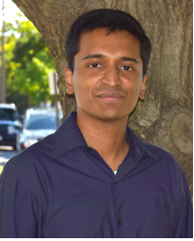The Department of Chemistry and Biochemistry in the J. William Fulbright College of Arts and Sciences hosts Narasimhan Rajaram, professor of Biomedical Engineering in the College of Engineeering, for a special seminar at 3:05 p.m. Friday, March 9.
The seminar, "Optical Spectroscopy for Functional and Molecular Sensing of Treatment Resistance in Cancer," is free and open to the public and will be held in CHEM 144. Refreshments will be served before the seminar at 2:45 p.m. in CHEM 133.
Improving outcomes associated with treatment of head and neck cancers demands early determination of metabolic, functional and molecular changes that unfold in the tumor microenvironment. A majority of head and neck cancer patients are treated initially with chemoradiation therapy because they present with locally advanced disease. Although radiation therapy typically lasts 6-7 weeks, tumor response is evaluated only 1-2 months after the end of therapy.
There is a critical need to identify patients with treatment-resistant tumors as early as possible, either before or shortly after beginning treatment, to reduce the adverse side effects of ineffective therapy. Rajaram will present recent results from diffuse reflectance and Raman spectroscopy that reveal key differences in tumor metabolism and oxygenation between radiation-resistant and sensitive tumors in pre-clinical animal models.
Rajaram is an assistant professor of biomedical engineering in the College of Engineering at University of Arkansas. He received his doctorate from the University of Texas at Austin and completed postdoctoral training at Duke University. His lab studies the relationship between tumor oxygenation and metabolism and the role that this relationship plays in promoting cancer progression, metastasis and treatment resistance.
Topics
Contacts
Ingrid Fritsch, professor
Department of Chemistry and Biochemistry
479-575-6499, ifritsch@uark.edu
